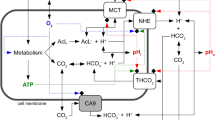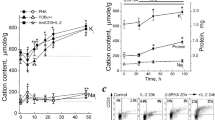Abstract
The postulate that low intracellular pH acts as a preconditioner for the destructuve effects of hyperthermia (42 degrees C) was examined, using a heat-sensitive line of malignant cells derived from rat mammary gland (SDB). Intracellular pH (pHi) was measured indirectly, from the distribution of the weak, non-metabolizable organic acid 5,5-dimethyl-2,4-oxazolidinedione (DMO) between intra- and extra-cellular water. Respiration, aerobic and anaerobic and anaerobic glycolysis of the cells were studied at normal pHi (pH 7-0-7-4) or at low pHi (pH 6-2-6-6) and at 38 degrees C or 42 degrees C over 6 h in Warburg manometers; the ability of the cells to replicate in culture was examined after 3 h or 6 h incubation in the flasks. The relationship between pHi and extracellular pH (pHe) depended upon the buffer system used and the exact pH in question; no assumption regarding pHi based only on pHe measurement could be made. At 38 degrees C and low pHi, the Pasteur effect became negative due to a relatively greater inhibition of anaerobic than aerobic glycolysis. Respiration was unaffected and cell replicative ability unimpaired. At 42 degrees C and normal pHi, respiration was totally inhibited after 4 h and the Pasteur effect was decreased, in this case due to a compensatory increase in aerobic glycolysis without alteration in anaerobic CO2 production. Low pHi in the presence of hyperthermia enabled cell respiration to continue at a reduced level with no further change in glycolysis. There was delayed cell replication after 3 h at 42 degrees C and inability to multiply following 6 h hyperthermia: low pHi did not influence these results. It is concluded that with these cancer cells, pHi values maintained in the region of 1-0 pH unit below normal for 6 h had no deleterious effect on the cells. No sensitizing effect of the low pHi for the destructive effect of hyperthermia on the cells was observed.
This is a preview of subscription content, access via your institution
Access options
Subscribe to this journal
Receive 24 print issues and online access
$259.00 per year
only $10.79 per issue
Buy this article
- Purchase on Springer Link
- Instant access to full article PDF
Prices may be subject to local taxes which are calculated during checkout
Similar content being viewed by others
Rights and permissions
About this article
Cite this article
Dickson, J., Oswald, B. The sensitivity of a malignant cell line to hyperthermia (42°C) at low intracellular pH. Br J Cancer 34, 262–271 (1976). https://doi.org/10.1038/bjc.1976.161
Issue Date:
DOI: https://doi.org/10.1038/bjc.1976.161



